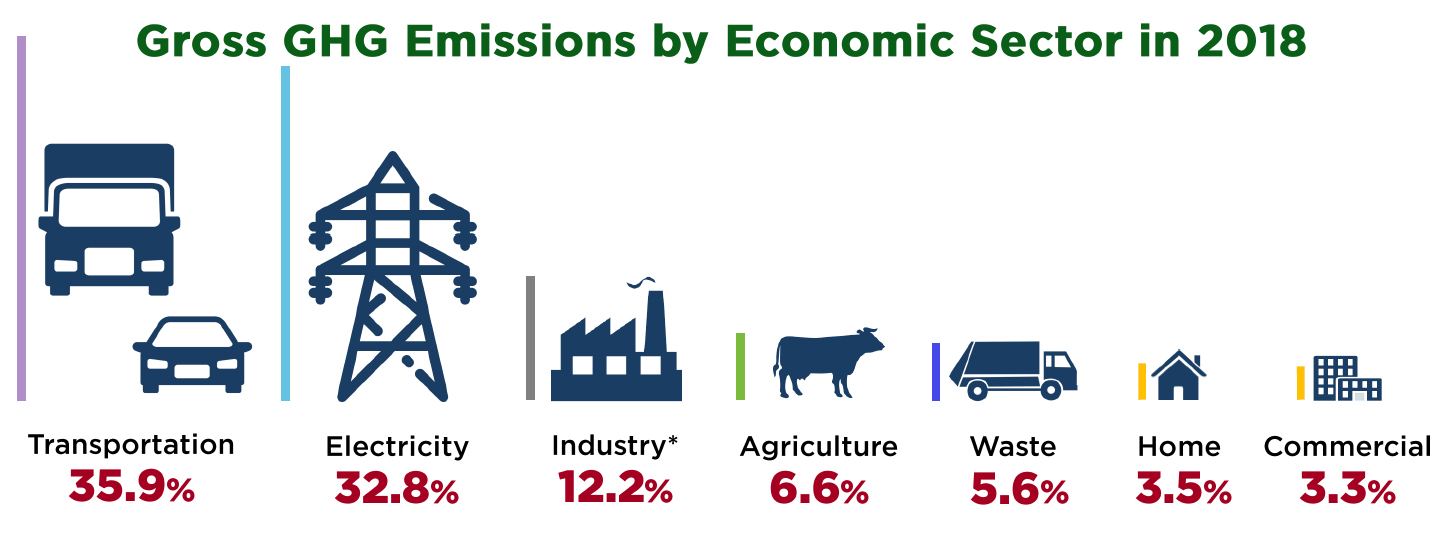 Source:
North Carolina Greenhouse Gas Inventory. *Industry includes fossil fuel combustion, natural gas and oil processes, and industrial processes.
Source:
North Carolina Greenhouse Gas Inventory. *Industry includes fossil fuel combustion, natural gas and oil processes, and industrial processes. In 2018, North Carolina’s transportation sector contributed 36 percent of the state's total greenhouse gas emissions. On Jan. 7 2022, Gov. Roy Cooper signed
Executive Order No. 246 (EO 246) calling for a 50 percent reduction in statewide greenhouse gas emissions from 2005 by 2030 and set a goal of at least 1,250,000 registered zero emission vehicles (ZEV) in the state by 2030. Reducing greenhouse gas emissions in the transportation sector is a critical component of the state’s strategy, and the N.C. Department of Transportation has been working with stakeholders to develop plans and strategies to reduce transportation emissions.
2019 Zero Emission Vehicle (ZEV) Plan
As part of its effort to facilitate the reduction of emissions in the transportation sector and drive the adoption of zero emission vehicles, NCDOT published a
Zero Emission Vehicle (ZEV) Plan in September 2019 and tracks monthly
registration data for electric and plug-in hybrid vehicles.
Multi-State Medium- and Heavy-Duty ZEV Memorandum of Understanding
On July 15, 2020, Gov. Cooper joined a bi-partisan group of 15 states and the District of Columbia in signing a
Memorandum of Understanding (MOU) committing to the electrification of
medium- and heavy-duty vehicles.
Zero Emission Vehicle Needs Assessment
As required in Executive Order 271, NCDOT performed a needs assessment to determine the infrastructure needs to support the electrification of the transportation sector.
Vehicle Miles Traveled (VMT) Reduction Study
As part of a settlement agreement signed in August 2019, NCDOT and settling parties agreed to convene a Vehicle Miles Traveled (VMT) reduction task force and work with a consultant to prepare a
VMT Reduction Study.
Carbon Reduction Program
The Carbon Reduction program provides funds for projects that reduce carbon dioxide emissions from various modes of transportation. Sixty-five percent of the state’s distribution is obligated to projects based on population. The remaining 35 percent can be disbursed to projects anywhere throughout the state.
NCDOT developed its
Carbon Reduction Strategy to support existing, current, and future efforts in reducing transportation-related greenhouse gas emissions. Future updates to the Carbon Reduction Strategy will be at a minimum of every four years per federal statute (§ 11403; 23 U.S.C. 175).
Comments on the Carbon Reduction Strategy may be submitted until Nov. 10.
Submit Comments